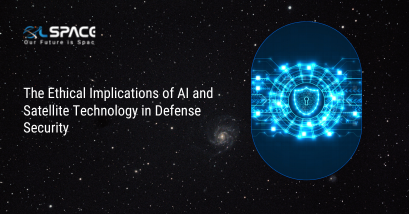04 June 2024
The Ethical Implications of AI and Satellite Technology in Defense Security

In the ever-evolving landscape of defense security, the integration of Artificial Intelligence (AI) and satellite technology has ushered in unprecedented capabilities. However, this technological advancement comes with a myriad of ethical implications that demand careful consideration and proactive measures. In this blog, we delve into the ethical nuances surrounding the utilization of AI and satellite technology in defense security, exploring key keywords like autonomy, surveillance, accountability, and international relations.
1. Autonomy:
One of the foremost ethical concerns revolves around the autonomy bestowed upon AI systems in defense operations. With advancements in machine learning and autonomous decision-making algorithms, there arises a pertinent question: to what extent should AI be entrusted with autonomous actions in military settings? The potential for AI to make split-second decisions raises concerns about accountability, transparency, and the adherence to ethical standards, especially in scenarios where human lives are at stake.Surveillance:
Satellite technology, coupled with AI-driven analytics, has revolutionised surveillance capabilities in defense security. While enhanced surveillance can aid in threat detection and strategic planning, it also raises concerns regarding privacy infringement and civil liberties. The indiscriminate collection of data, coupled with the potential for misuse or abuse, underscores the importance of establishing robust ethical frameworks to govern the ethical use of surveillance technologies.Accountability:
Ensuring accountability in the deployment of AI and satellite technology is paramount to mitigating ethical risks. Who bears responsibility for the actions of autonomous AI systems? How can we ensure transparency and accountability in decision-making processes that involve complex algorithms and remote sensing technologies? These questions underscore the need for clear lines of accountability and mechanisms for ethical oversight to prevent the erosion of trust and the potential for unintended consequences.International Relations:
The proliferation of AI and satellite technology in defense security also has profound implications for international relations. The development and deployment of advanced military capabilities can escalate tensions between nations and exacerbate existing geopolitical conflicts. Moreover, concerns about technological supremacy and the potential for arms races underscore the need for international cooperation and dialogue to address the ethical challenges posed by AI and satellite technology in defense security. In conclusion, the integration of AI and satellite technology in defense security holds immense promise for enhancing national security and safeguarding against emerging threats. However, it also presents profound ethical dilemmas that require careful consideration and proactive mitigation strategies. By prioritising principles such as transparency, accountability, and international cooperation, we can navigate the ethical complexities inherent in the intersection of AI and satellite technology in defense security, ensuring that technological advancements are wielded responsibly in service of global peace and security.